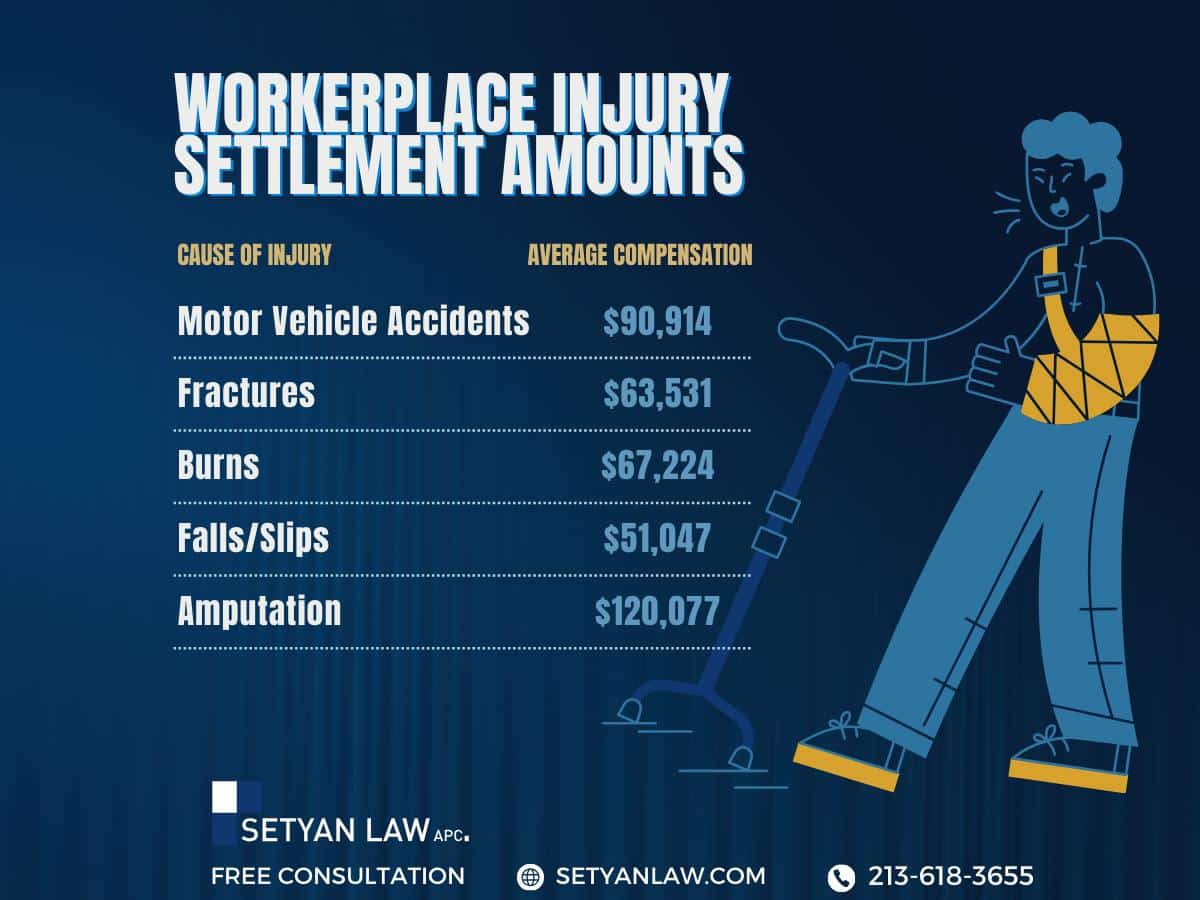Updated July 8, 2025
How to Get Workers Compensation for Day Laborers
Did you know that day laborers for hire face some of the highest workplace injury rates in America, yet many never receive the workers' compensation benefits they're legally entitled to?
Despite performing some of the most physically demanding and hazardous work in construction, landscaping, and agriculture, day laborers often struggle to access essential medical care and lost wage benefits after workplace injuries. Unfortunately, many are incorrectly told they don't qualify for workers' compensation because of their temporary status or are intimidated into not filing claims.
Under California law and in many other states, day laborers have the same right to workers' compensation as permanent employees when injured on the job. However, the unique challenges of temporary work – including lack of documentation, misclassification as independent contractors, and sometimes immigration status concerns – create significant barriers to receiving benefits.
This straightforward guide will walk you through your rights as a day laborer, explain how to determine if you're eligible for workers' compensation, outline the steps to take after an injury, and show how legal assistance can help overcome common obstacles. Whether you've been working at a jobsite for one day or several months, understanding these critical protections could make all the difference in your recovery and financial stability.
Who Counts as a Day Laborer?
Day laborers perform essential work across many sectors of the economy. These workers accept short-term employment, typically hired for a single day or just a few days to complete specific tasks without long-term commitments. Understanding who qualifies as a day laborer helps clarify workers' compensation eligibility.
Common jobs and industries
Day laborers primarily work in physically demanding fields that require flexible staffing. The construction industry ranks as one of the largest employers of day laborers, often bringing in workers when projects fall behind schedule or require additional manpower [1]. Additionally, these workers fill crucial roles in:
- Landscaping and groundskeeping: Mowing, planting, trimming trees, and maintaining golf courses [1]
- Agriculture: Picking fruits, vegetables, and performing other crop-related tasks [1]
- Moving and loading: Helping families relocate or loading/unloading goods [1]
- Warehouse operations: Working as pickers, packers, and stock clerks [2]
- Event staffing: Setting up, providing security, and cleaning after events [2]
- Cleaning services: Post-construction cleanup, hotel housekeeping, and domestic work [3]
Statistics show day laborers are predominantly employed by homeowners/renters (49%) and construction contractors (43%) [3]. Furthermore, many perform skilled work such as carpentry, electrical, plumbing, and masonry, contrary to the perception that all day labor involves unskilled work [3].
How day laborers are typically hired
Most day laborers find work through informal channels rather than traditional employment processes. They commonly secure jobs through:
- Community labor centers or worker centers that connect workers with potential employers [4]
- Designated street corners or locations where employers seek temporary help [5]
- Temporary staffing agencies that maintain pools of available workers [1]
- Word-of-mouth and informal networks within communities [5]
Once hired, workers negotiate their daily rate and typically receive payment immediately after completing the assigned task. Many day labor programs specifically arrange for workers to "be paid cash at the end of their negotiated work assignment" [4]. This immediate payment system addresses the urgent financial needs many day laborers face.
Misconceptions about day laborers
Several myths about day laborers persist despite evidence to the contrary:
First, the assumption that all day laborers are undocumented immigrants is false. Although many are immigrants, numerous day laborers are citizens or legal residents seeking daily employment opportunities [1].
Second, day laborers are often incorrectly perceived as unskilled. In reality, many possess specialized skills, particularly in trades like construction or landscaping [1]. Some even had professional careers in their home countries before migrating to the United States [6].
Third, although many believe day laborers prefer temporary work, most seek stable employment. Financial necessity or lack of permanent opportunities typically drives workers toward day labor rather than preference for irregular employment [1]. In fact, organizations like worker centers often serve as "an entry point to the local workforce, as a place to transition to a more stable job" [6].
Finally, contrary to popular belief, day laborers make significant contributions to local economies. Most have lived in the United States for over six years, attend church regularly, participate in community organizations, and pay taxes—even those without Social Security numbers contribute billions to programs like Medicare and Social Security [6].
Are Day Laborers Eligible for Workers’ Compensation?
The legal status of day laborers for hire often creates confusion about workers' compensation eligibility. Contrary to what many employers claim, most day laborers qualify for these crucial benefits when injured on the job.
Employee vs. independent contractor
The cornerstone of workers' compensation eligibility hinges on classification as an employee rather than an independent contractor. For day laborers, this distinction proves critical. Generally, if someone controls when, where, and how you work, you're considered an employee regardless of how briefly you're employed.
Key factors that typically classify day laborers as employees include:
- The employer provides tools, equipment, and materials
- The employer directs how the work is performed
- Payment occurs hourly or daily rather than by project completion
- The worker lacks control over hiring assistants or determining work methods
Even when labeled as "independent contractors," many day laborers legally qualify as employees under what's called the "economic realities test." This test examines whether workers depend economically on the business rather than operating independently. Consequently, misclassification represents one of the biggest hurdles day laborers face when seeking benefits.
State-specific rules and thresholds
Workers' compensation requirements vary substantially by state, creating a patchwork of protections for day laborers. Most states require employers to provide coverage based on:
- Number of employees (ranging from one to five workers)
- Industry type (construction often has stricter requirements)
- Payroll size (some states exempt small employers below certain thresholds)
California law, notably, requires workers' compensation coverage for all employees—even those hired for just one day. Indeed, employers in California must secure coverage before any employee begins work, regardless of the job's duration.
Other states have different thresholds. In New York, for instance, all construction employers must provide coverage regardless of size, while other industries may have employee minimums. Meanwhile, Texas stands as the only state where workers' compensation remains entirely optional for private employers.
The agriculture sector, which employs numerous day laborers, often operates under special rules. Certain states exempt farm workers from mandatory coverage or apply different thresholds based on farm size or seasonal status.
Temporary and undocumented worker rights
Temporary status rarely affects workers' compensation eligibility. The brief duration of employment does not negate an employer's responsibility to provide these benefits. Moreover, many states explicitly include day laborers in their workers' compensation statutes.
As for immigration status, most states follow the principle that undocumented workers qualify for workers' compensation. Courts have repeatedly ruled that excluding undocumented workers from benefits would incentivize hiring them over documented workers, undermining workplace safety. In California and many other states, workers can file claims regardless of immigration status.
Nevertheless, undocumented workers face unique challenges when claiming benefits. They may encounter:
- Threats of deportation or retaliation
- Difficulty proving employment relationships due to cash payments
- Lack of witnesses willing to confirm working conditions
- Limited access to medical facilities requiring documentation
Some states have enacted provisions to address these barriers. For example, California prohibits inquiries about immigration status during workers' compensation proceedings, thereby protecting claimants from intimidation.
Temporary staffing agencies warrant special mention, as they typically bear responsibility for workers' compensation coverage rather than the client businesses where day laborers perform actual work. This arrangement sometimes creates confusion about who holds responsibility for injuries.
Challenges Day Laborers Face When Filing Claims
Challenges Day Laborers Face When Filing Claims
Even with legal protections in place, day laborers for hire frequently encounter significant obstacles when attempting to access workers' compensation benefits. These barriers often prevent injured workers from receiving the medical care and financial support they desperately need.
Lack of documentation or contracts
Many day laborers work without formal contracts or employment documentation, making it exceptionally difficult to prove their employment status. Workers typically receive cash payments, leaving no paper trail of the employment relationship. As noted in studies of day labor, workers often lack basic information about their employers, including full names, business addresses, or contact details [7].
This absence of documentation becomes particularly problematic when filing workers' compensation claims, which require proof of an employment relationship. One UCLA study estimated that while approximately one-third of day laborers employed by homeowners were likely eligible for workers' compensation benefits, only 5% actually received payment for medical bills or lost work time [8].
Fear of retaliation or job loss
The precarious nature of day labor creates a power imbalance that leaves workers vulnerable to intimidation. Day laborers frequently avoid reporting injuries because they worry about losing future work opportunities [9]. Since many rely on day-to-day income for survival, this fear is especially powerful.
Some employers actively discourage claims through threats. According to research, employers sometimes harass injured workers with language barriers by threatening job loss or deportation [10]. Others pressure workers into signing "under the table" agreements instead of filing formal claims [10]. Under California law and similar statutes, such retaliation is illegal, yet it remains commonplace due to limited enforcement.
Language barriers and legal confusion
For many day laborers, English is not their primary language, creating substantial communication challenges throughout the claims process. These language barriers affect every stage from initial injury reporting to medical treatment and legal proceedings.
Studies reveal that workers with language barriers encounter significant gaps in interpretation and translation services [10]. Without adequate language support, workers struggle to:
- Communicate effectively with healthcare providers
- Understand medical instructions and treatment plans
- Navigate complex legal processes and paperwork
- Appear credible during claim investigations
The combined effect of these communication barriers directly undermines workers' compensation claims [10]. Beyond these immediate challenges, the workers' compensation system itself can be confusing, with many day laborers simply unaware of their rights or the existence of benefits [10].
These structural barriers, coupled with language challenges, significantly impact injured workers' physical and mental health, recovery progress, and ability to return to work [10].
What to Do After a Work Injury
After getting injured at work, taking immediate action significantly improves your chances of receiving workers' compensation benefits. Studies show that 24% of injuries among day laborers go unreported primarily due to fear of being fired [11]. Taking these crucial steps promptly can protect both your health and your legal rights.
Report the injury immediately
First, inform your supervisor, employer, or human resources department about your injury as soon as possible. This notification serves as the official starting point for your workers' compensation claim. Put your report in writing whenever feasible to create a paper trail [5]. Under California law and in many other states, there are strict deadlines for injury reporting, ranging from "as soon as possible" to 180 days depending on location [1].
If you were hired through a staffing agency, remember that the agency—not the worksite—may be your legal employer for notification purposes [1]. Promptly reporting the injury prevents employers from later claiming they were never informed about the accident.
Document everything
Thorough documentation strengthens your claim substantially. Collect and preserve:
- Photos of your injuries and the accident scene
- Names and contact information of your employer
- Medical records and bills
- Work restrictions from doctors (get these in writing)
- Receipts for out-of-pocket expenses
- Dates of medical appointments and treatments [1]
This documentation proves the connection between your work and injury, making it harder for insurers to deny your claim [12].
Seek medical attention
Even for seemingly minor injuries, getting proper medical care is essential. For emergencies, seek immediate treatment, then notify your employer afterward [13]. In non-emergency situations, ask your employer about approved medical providers, as workers' compensation typically requires evaluation by employer-selected healthcare professionals [1].
Be sure to tell medical providers that your injury occurred at work, as this critical information must appear in your medical records [5]. Importantly, many day laborers for hire avoid treatment because they lack money or insurance [11]—but workers' compensation should cover these costs.
Talk to witnesses if possible
Coworkers who saw your accident can provide invaluable support for your claim. Their statements often make the difference when employers dispute that an injury occurred [2]. Ask witnesses to write down what they observed, including:
- What they saw happen
- When and where the incident took place
- Any factors they believe contributed to your injury [2]
Collect these statements early while memories remain fresh, yet always encourage honest accounts rather than suggesting what witnesses should say [2].
How a Lawyer Can Help You Get Compensation
Securing legal representation dramatically increases the chances of receiving fair compensation for day laborers for hire. Even with legitimate claims, many injured workers face significant hurdles that attorneys are uniquely positioned to overcome.
Proving employment status
For day laborers, establishing an employer-employee relationship is often the first challenge. A workers' compensation lawyer gathers crucial evidence—including pay stubs, witness testimony, and work agreements—to prove proper classification. They effectively counter employer attempts to misclassify workers as independent contractors, which would disqualify them from benefits. Attorneys understand the "economic realities test" that examines whether workers depend economically on the business rather than operating independently.
Filing and appealing claims
The claims process involves strict deadlines and complex paperwork that can overwhelm injured workers. Attorneys ensure all forms are correctly completed and filed on time, protecting your rights throughout the process. If your claim is denied, a lawyer can navigate the appeals process, which may include filing a Declaration of Readiness to Proceed and representing you at hearings before the Workers' Compensation Appeals Board. Without legal guidance, appealing denied claims can be virtually impossible for day laborers.
Handling employer pushback
Many employers actively resist workers' compensation claims through various tactics. A skilled attorney counteracts these strategies by gathering medical evidence to prove injury severity, handling all communications with insurance providers, and representing you at hearings if disputes arise. They can also identify weaknesses in insurance company reasoning and build strong cases to overturn claim denials.
Protecting against retaliation
Under California law and federal statutes, it's illegal for employers to retaliate against workers who file compensation claims. Nonetheless, day laborers often face threats, reduced hours, or termination after reporting injuries. Workers' compensation attorneys provide protection by explaining legal rights, documenting retaliatory actions, and taking appropriate legal measures against employers who engage in illegal intimidation tactics. This protection is particularly valuable for undocumented workers who may fear immigration consequences.
Conclusion
Day laborers face numerous obstacles when seeking workers' compensation benefits despite their legal right to protection. Misclassification as independent contractors, lack of documentation, fear of retaliation, and language barriers create significant hurdles for injured workers. Nevertheless, these challenges can be overcome with proper knowledge and action.
Taking immediate steps after a workplace injury significantly increases your chances of receiving deserved benefits. Prompt reporting, thorough documentation, proper medical care, and witness statements build a strong foundation for successful claims. Additionally, understanding your employment status and state-specific regulations empowers you to advocate for your rights effectively.
Legal representation makes a substantial difference for day laborers navigating the workers' compensation system. Attorneys help prove employment status, manage complex paperwork, counter employer resistance, and protect against illegal retaliation. This support proves especially valuable for workers with limited English proficiency or documentation concerns.
Remember, your temporary employment status does not diminish your right to workers' compensation. Whether you've worked for one day or several months, employers remain responsible for providing safe working conditions and appropriate benefits after injuries. Above all, understanding these protections represents the first step toward ensuring fair treatment and securing the medical care and financial stability you deserve during recovery from workplace injuries.
References
[1] – https://www.forthepeople.com/blog/next-steps-what-do-after-getting-injured-work/
[2] – https://www.southernmarylandlawfirm.com/blogs/7608/the-role-of-witnesses-in-workers-compensation-claims-why-your-co-workers-matter
[3] – http://pasadenajobcenter.com/about-us/who-employs-day-laborers/
[4] – https://www.austintexas.gov/department/day-labor
[5] – https://www.mahaneypappaslaw.com/library/three-important-steps-to-take-after-being-hurt-on-the-job.cfm
[6] – https://portlandvoz.org/blog/2019/05/03/mythbusters-about-day-laborers
[7] – https://lawofficeofronaldpackerman.com/day-laborers/
[8] – https://losh.ucla.edu/wp-content/uploads/sites/37/2016/01/On-The-Job-Injuries-And-Day-Laborers-April-2017.pdf
[9] – https://www.sternberglawoffice.com/can-day-laborers-receive-workers-compensation-benefits/
[10] – https://injuredworkersonline.org/new-study-on-language-barriers-in-workers-compensation/
[11] – https://pmc.ncbi.nlm.nih.gov/articles/PMC9233524/
[12] – https://workerscompny.com/the-importance-of-documentation-in-workers-compensation-cases/
[13] – https://cruzfirm.com/blog/steps-to-take-after-a-workplace-accident/
Call Setyan Law at (213)-618-3655 for a consultation.






